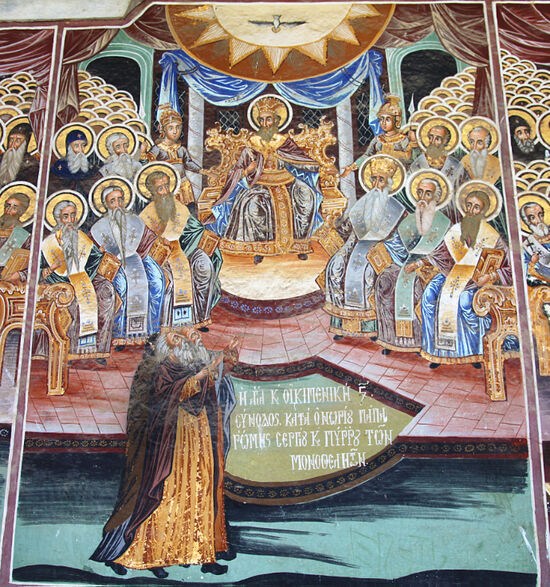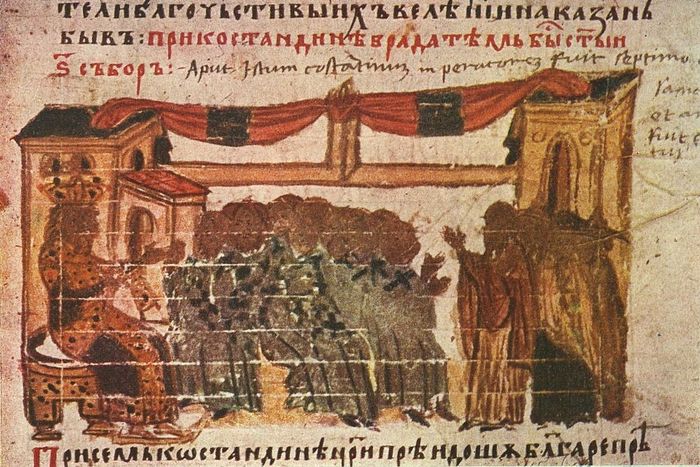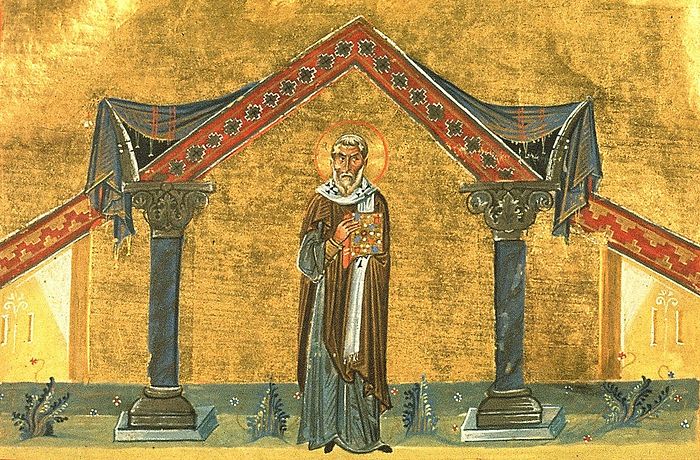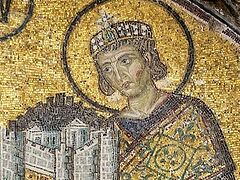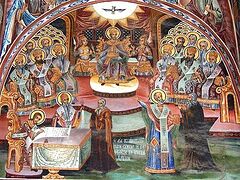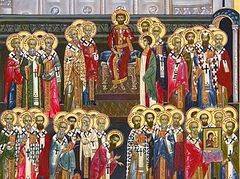Pravoslavie.ru published a fragment from the relatively new book of Church historian and canonist Archpriest Vladislav Tsypin “History of Pre-Christian and Christian Europe”.
On September 10, 680, Emperor Constantine IV issued a Sacra addressed to the Patriarch of the Imperial City, George I of Constantinople, on the convocation of the Council, which opened “during the reign of the God-crowned and most graceful and illumined Flavius Constantine the most pious, the God-installed Great Sovereign and eternally August Autocrat, in the twenty-seventh year of his reign, and in the thirteenth of the Consulate of his God-wise meekness, and also his God-preserved brothers Heraclius and Tiberius, in the twenty-second year, on the seventh day of the month of November, the ninth Indiction”,1 that is, on November 7, 680, in the Trullo2 chamber of the Imperial Palace.
The Latin name and phrase for the chamber, “in trullo”, is in reference to its vaulted ceiling. Emperor Constantine presided over the first eleven sessions of the Council. The presidium on the right side of the imperial throne was occupied by the Patriarchs George of Constantinople, Macarius of Antioch and the Apocrisiarius of the Alexandrian throne, Hieromonk Peter. On the left side of the emperor sat the Papal Legates—the Presbyters Theodore and George, and the Deacon John, as well as the locum tenens of the throne of Jerusalem, Presbyter Theodore. In the middle of the chamber, on an analogion, lay the Gospel.
The first session was attended by forty-three bishops, and then the number of participants in the Council grew. The last act bears one hundred and seventy-four signatures of bishops or clerics representing them. Theophanes the Confessor in his Chronicles writes about the “Sixth Ecumenical Council of two hundred and eighty-nine bishops”—but this is undoubtedly an exaggeration of the number of fathers at the council. The council lasted more than ten months: from November 7, 680 to September 16, 681. During this time, eighteen sessions were held. Starting from the twelfth meeting, they were presided over by dignitaries appointed by the emperor—patricians.
Already at the first meeting, a sharp theological discussion began. The pope's representatives, addressing the emperor, said: “Around forty-six years ago, the former primates at different times of your God-protected city, that is, Sergius, Paul, Pyrrhus and Peter, and also Cyrus who was the erstwhile primate of Alexandria, and Theodore , who was the bishop of the city which is called Paran,3 and some others who followed them, introduced new expressions that were contrary to the Orthodox Faith, and caused confusion in the Ecumenical (Universal) Church, confessing and teaching that in the œconomy4 of the incarnation of One of the Holy Trinity—Our Lord Jesus Christ—that He possesses [only] one will and one action. Many times, our apostolic throne, which is most loyal to you, has rejected this teaching, and having since prayed and begged, though in the end, being unable to turn them away from such an evil opinion, we now call upon Your God-crowned Might to let the representatives of the Most Holy Church of Constantinople explain from whence this innovation has been made manifest.”5
The emperor asked the Patriarchs of Constantinople and Antioch for an explanation. The challenge put forth by the papal legates was taken up by the Patriarch of Antioch Macarius, and as it turned out, he still adhered to the Monothelite Christology: “We did not make any innovations in doctrine, but as we received from the Ecumenical Councils and the holy respected fathers, also from the primates of this holy city Sergius, Paul, Pyrrhus and Peter, and also from Honorius, the former pope of ancient Rome, and Cyrus, the former Pope of Alexandria, the teaching concerning the will and action.”6
To [attempt to] confirm the compliance of the Monothelite teaching with Tradition, Patriarch Macarius asked to bring the acts of the previous Councils to the chamber. By order of the emperor, the Chartophylax Deacon George brought from the patriarchal library books of conciliar acts, and Antiochian cleric Hieromonk Stephen read out one passage from the acts of the Third Ecumenical Council—a quote from the letter of St. Cyril of Alexandria to Emperor Theodosius II, which said that through the Lord Jesus Christ, “Kings reign and the mighty work of righteousness, as the Scripture says, for His will is almighty.”7 After this, Macarius said: “Behold O Sovereign, I have proved that Christ possesses one will.”8 In response to such thin “proof”, the papal representatives explained that “His Holiness Cyril wrote these words in reference to [Christ’s] Divine and omnipotent nature, which He has in common with the Father and the Holy Spirit.”9
Certainly, individual quotes taken out of context were not enough to draw theological conclusions on their basis. Therefore, by order of the emperor, the Acts of the Council of Ephesus were read in full, and at the second council meeting, held on November 10, the acts of the Council of Chalcedon were read. When reading the tomos of Pope Leo, the representatives of the Roman Church paid special attention to the words that, “Both natures, in mutual communication, reveal actions inherent in their nature”,10 having found in them a patristic testimony of two actions (wills) in Christ, but Patriarch Macarius, addressing the emperor, said: “May it please Your Majesty, I do not confess two actions (wills), and I do not think that Leo of blessed memory in those words spoke of two actions (wills).”
This was followed by a dialogue with the emperor: “Do you purpose that he professed one action?” “I am not talking about numbers, but, following Saint Dionysius, I call His action Theanthropic.” “How do you understand a Theanthropic action; [How do you reason this works]?” “I do not reason.”11 Macarius replied. The reading of the conciliar acts was resumed and continued until the end of the meeting.
At the third meeting, held on November 13, the acts of the Fifth Ecumenical Council were read. At the same time, forgeries were discovered: “The words of Minas of blessed memory, Archbishop of Constantinople, to Vigilius…the Pope of Rome, concerning that Christ has only one will”12, turned out to be a falsification, included in the acts of the Fifth Council under the Monothelite patriarchs. Patriarch Minas died six years before the Council convened under the Patriarch Eutyches. The falsity of this document was also exposed by the fact that the sheets containing these “Words” were not numbered. By the order of the emperor, these sheets were removed from the acts of the Fifth Ecumenical Council. The fakes turned out to be, at their later study by a special commission, the letters of Pope Vigil, which were retroactively included in Acts, addressed to Emperor Justinian and the August Empress Theodora, with a mention of “one action” in Christ. The reading of these letters was interrupted by the observation of the papal legates that Vigilius never professed one action.
At the next meeting, on November 15, the Greek translation of the message of Pope Agatho and the Roman Council, addressed to Emperor Constantine and his co-rulers Augustus Heraclius and Tiberius, was read out. The fifth session of the Council took place after a twenty-day break on December 7. During this session, a scroll was read of excerpts from the works of the holy fathers, presented by Patriarch Macarius of Antioch, “teaching,” as he asserted, “that the one single will of our Lord Jesus Christ, is also the will of the Father and the Holy Spirit.”13
Then, the acts of the Council were interrupted for more than two months. At the meeting held on February 12, 681, the reading of the sayings of the fathers collected by Patriarch Macarius and his assistants, which, in his conviction, contained the doctrine of one will in Christ, was continued. After listening to them, the pope's messengers declared: “With the testimonies presented, the God-loving Macarius, Archbishop of Antioch, Stephen, his disciple, Peter the God-loving Bishop of Nicomedia, and Solomon, the God-loving Bishop of Claneus, did not in the least prove one will and one action in the œconomy of our Lord Jesus…They gave out as testimonies of one will in the œconomy of the incarnation of our Lord Jesus Christ, those that relate to the doctrine of the one will of the Holy Trinity; and those testimonies that refer to the action and relate to the œconomy of the incarnation…they distorted both in the meaning and in expressions thereof.”14 Therefore, the papal legates were asked to verify the excerpts presented, with the scrolls of the original texts of the fathers, which were kept in the patriarchal library. The next day, February 13, the legates themselves presented a collection of patristic testimonies of two wills and two actions in Christ.
The eighth act of the Council took place on March 7, and it was critical. Patriarch George of Constantinople, who had previously spoken out in support of Macarius of Antioch, declared his agreement with the confession of the diathelite15 doctrine, set out in the letter of Pope Agatho to Emperor Constantine. Following him, other bishops of the Patriarchate of Constantinople declared their commitment to the doctrine of the two wills of Christ. Then the emperor appealed to Patriarch Macarius: “What do you think about the œconomy of our Lord Jesus Christ?”16
In response, Macarius, not bothered by the fact that his formerly like-minded colleagues had changed their positions, again solidified his Monothelite teaching: “We … confess our one Lord Jesus Christ in a new image, without bodily desires and human thoughts, because, having one desire to accept of all these passions, He … had the same power to endure all of them … and in this, we agree with the teaching of both the five Holy Councils and the God-wise Honorius, Sergius, Paul, Peter and others … Our Lord Jesus Christ has one hypostatic will and His Theanthropic action. We … confess that the incarnate God the Word did the divine not as God, and the human not as a man, but performed some kind of new Theanthropic action.” At the direction of the emperor, the confession of Macarius, set out in writing, was delivered to the chamber and read out. In it, he added to the anathematization of the heresiarchs and heretics previously condemned by the Ecumenical Councils, “Maximus, who did not deserve a name, and his wicked disciples, who joined them; this pagan (Saint Maximus the Confessor—O.C.) taught Manichaeism17 and to reject the body of Christ our God; (we anathematize) and his wicked teaching, which our most blessed fathers rejected before us; I mean Honorius, Sergius and Cyrus and the teachers and primates who came after them.”18
Then, Macarius mentioned among the opponents of the teachings of Maximus, the great-grandfather of Emperor Constantine IV, Heraclius. In response to the emperor's proposal to confess faith in “two natural desires and two natural actions”19 in Christ, Macarius declared: “I will not speak of two natural desires and two natural actions in the œconomy of the incarnation of our Lord Jesus Christ, even if they cut me down into small pieces and thrown me into the sea.”20 After listening to Macarius, the fathers of the Council compared the extracts he made from the works of the fathers with their original texts, and as a result, “gaps were established, made, according to Patriarch Macarius’ own statement, in order to substantiate Monotheism”.21
At the meeting on March 8, the compilation of patristic quotations, made by Macarius and his assistants, continued to be verified with the original texts of the fathers, which revealed the presence of forgeries and malicious additions in it. An accusation was brought against Patriarch Macarius and his disciple, monk Stephen, on the basis of which a conciliar verdict was passed: “Because it was clearly revealed that you were perverting divine dogmas and distorted the teachings of the saints and respected fathers, but rather accepted the opinion of heretics and followed what they taught, to the destruction of the Orthodox people; then we determine that you should be deprived of all hierarchical dignity and service.”22 Acclamations rang out: “Many years to the Emperor! Many years for the Orthodox Emperor! Behold the heretic! Wicked years to the new Eutychius! To the new Apollinarius, evil years! Begone heretic!”23 And the disciple of Macarius, Stephen, as the Acts of the Council informs us, “was expelled and driven out.”24
At the tenth meeting, on March 18, the reading of patristic testimonies continued, and the texts of anathematized heretics were read out, in which Monothelite ideas were revealed, which compromised the defenders of the doctrine of the one will in Christ, by their closeness with their judgments. In conclusion, bishops, clergy and monks, who previously admitted Monothelite utterances, announced their confessions, in which they declared their complete agreement with the Diathelite teaching contained in the letter of Pope Agatho and the Roman Council.
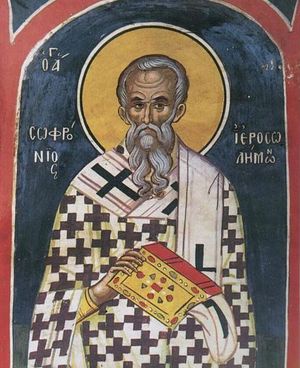 Patriarch of Jerusalem Sophronius On March 20, the session of the Council began with the reading of the epistle of the Patriarch of Jerusalem Sophronius to Patriarch Sergius of Constantinople, which was recognized as Orthodox. Then they began to read out the writings of Macarius and his disciple Stephen, already condemned by the Council, and were interrupted by the council's outcry: “Cease the reading of these soul-destroying writings!”25 To prove the mutual agreement of the heretical evidence, it was decided to “extract from these writings … obvious blasphemy.”26 Closing the meeting, Emperor Constantine announced that he would not be able to attend the next meetings, when “a large and most important part of the present deed has been completed”27, due to being busy with “the affairs of our Christ-loving state”,28 commanding the patricians Constantine and Anastasia and councilors Polyeuctus and Peter, being present at the Council, to represent the emperor there. Thus, they were assigned presidential duties.
Patriarch of Jerusalem Sophronius On March 20, the session of the Council began with the reading of the epistle of the Patriarch of Jerusalem Sophronius to Patriarch Sergius of Constantinople, which was recognized as Orthodox. Then they began to read out the writings of Macarius and his disciple Stephen, already condemned by the Council, and were interrupted by the council's outcry: “Cease the reading of these soul-destroying writings!”25 To prove the mutual agreement of the heretical evidence, it was decided to “extract from these writings … obvious blasphemy.”26 Closing the meeting, Emperor Constantine announced that he would not be able to attend the next meetings, when “a large and most important part of the present deed has been completed”27, due to being busy with “the affairs of our Christ-loving state”,28 commanding the patricians Constantine and Anastasia and councilors Polyeuctus and Peter, being present at the Council, to represent the emperor there. Thus, they were assigned presidential duties.
At the 12th meeting, on March 22, the reading of the documents related to the first phase of the disputes, initiated by the appearance of heresy was continued. Before the closing of the meeting, the dignitaries representing the emperor turned to the Fathers of the Council: “Our most pious and divinely placed sovereign and great emperor, imitating the love for mankind of the God who crowned him, and awaiting the conversion of Macarius, asks your Holy and Ecumenical Council through us, his unworthy servants, will [Macarius] be restored to his throne, if he appeals after his deposition by your Holy Council?”29
The answer was categorical: “The divine canons do not in any way allow Macarius to sit on a teaching throne, as he has grown old in the dogmas of impiety … Therefore, our Holy Council … will by no means accept this Macarius on the hierarchical throne … who was deposed and anathematized in council, and we also ask that he be removed from the boundaries of this God-preserved Imperial City together with his like-minded people.”30
The imperial dignitaries adopted this resolution, after which the representatives of the Antiochian Patriarchate present at the Council elected a successor to the deposed Macarius, and the new Patriarch of Antioch Theophanes took part in the meeting of the Council, held on April 5.
At the thirteenth meeting, on March 28, the Council passed a resolution concerning the previously deceased heresiarchs. Their writings were recognized as “alien to the apostolic teaching and definitions of the holy Councils and all glorious Holy Fathers” and “soul-damaging.”31
The adopted resolution further stated: “We reject their wicked dogmas, and we have assigned their names to be excommunicated and excluded from the Holy Church of God, namely the names of Sergius, the former primate of this God-protected Imperial City, who began a correspondence about this wicked dogma, Cyrus of Alexandria, Pyrrhus, Paul and Peter … then Theodore, Bishop of Faran … In addition, we find it necessary, together with them, to expel and excommunicate from the Holy Church of God and anathematize Honorius, the former Pope of ancient Rome, because from his letters to Sergius, we were convinced that he completely shared his opinion and confirmed this wicked teaching.”32
The condemnation of Honorius did not provoke any protests at the Council, nor any opposition whatsoever on the part of the papal legates, who apparently did not even think of the concept of papal infallibility—the “dogma” of the First Vatican Council. The messengers of the Holy Hierarch Agatho strove only to ensure that the Council formulated the Orthodox teaching of two wills and two actions in Christ, which was served both by the presentation of the dogma itself in the Council’s Oros, and the condemnation of false doctrine, which distorts this dogma, along with anathematization of the heresiarchs themselves, including Honorius, who at one time occupied the Roman Papal Throne.
Since those days, the case of the conciliar anathematization of Pope Honorius has been the most vulnerable gap in the defense of the doctrine of papal infallibility, from which, with logical inevitability, follows the thesis that none of the legitimate bishops of Rome could be mistaken in the official presentation of the doctrine.
To defend this curious idea requires a fair amount of dialectical audacity. It, in particular, was discovered by the famous apologist of papal infallibility from Uniate circles—P.P. Ioannou. The views of Pope Honorius, he argues, were Orthodox, but expressed in an unsuccessful language, which served as a weapon for the Monothelites against the defenders of the Orthodox doctrine of two wills in Christ, for which Honorius was condemned by the Council; therefore, the popes who are the successors of Honorius recognized his anathema. “Condemnation of Honorius,” writes P.P. Ioannou, “in fact, did not diminish the authority of the throne of Peter in matters of faith.”33
However, the circumstances prove the opposite of what the inventive canonist wanted to prove. If, prior to the condemnation of Honorius, the Popes had claimed doctrinal infallibility, and the Church recognized their claims as legitimate, then the condemnation of Honorius either could not take place at all, or, by its condemnation of the pope, the Council would have rejected the previously recognized claims. In fact, the See of Rome at that time did not claim infallibility, and therefore, condemning one of the bishops who occupied it [the Pope], just as other bishops were condemned at other Councils, including the primates of leading thrones, the Council, in the words of P.P. Ioannou, “did not detract from the authority of the throne of Peter.” And neither Saint Agatho nor his successors, who were overly scrupulous in matters concerning the prerogatives of the Roman throne, were not scandalized by the condemnation of Pope Honorius.
On April 5, the Council heard the acts of the preceding Council, and as a result, malicious interpolations were discovered in them—texts containing expressions favorable to the doctrine of the one will in Christ. The analysis of the documents in question ended with the proclamation of “an anathema to the so-called Word of Minas to Vigilius and…the books of Vigilus to Justinian and Theodora of blessed memory, which turned out to be forged”.34 This was followed by exclamations: “Anathema to all those who forged documents in the acts of the Holy and the Fifth Ecumenical Council. Anathema to those who preached orally and expounded in writing, who preach or will preach one will and one action in the œconomy of the incarnation of our Lord Jesus Christ…Eternal Memory to the Saints of the Ecumenical Councils! Eternal memory to the Fifth Holy Council! Many years to the Emperor! Many years to the great Emperor Constantine! Many years to the Emperor-peacemaker! Many years to the defender of Orthodoxy! Son of God, give him long life! Son of God, give him victories!” At the end of the meeting, at the suggestion of Bishop Theodore of Trimythous, the letter of St. Athanasius of Alexandria was read out concerning the Gospel passage, Now is my soul troubled; and what shall I say? Father, save me from this hour: but for this cause came I unto this hour (Jn 12:27),35 in which the Holy Father says about the Lord: “He is God, but in the flesh, and in the flesh fulfills obedience, and triumphs over the will of the flesh by the will of the Divine…The will of the flesh had to be defeated, to submit to the will of the divine.”36 In the word of St. Athanasius, the Council found a clear patristic testimony about the Church's confession of the doctrine of two wills of Christ: the divine will and the human will.
On April 14, in the Hagia Sophia Cathedral of the capital, the papal legate, Bishop John of the Port of Rome, performed the Paschal Liturgy according to the Western Rite.
On April 26, one hieromonk Polychronios was invited into the cathedral palace. A zealous fanatical Monothelite, confident in his righteousness, he fervently preached heresy and, probably, found many supporters. Because of the magnitude of the danger he was spreading, it was decided to bring him to the Council. When he was brought into the cathedral chamber and demanded to express his faith, he boldly replied as follows: “I will give an account of my faith on the grave of a dead man, with the invocation of the Son of God, so that He would raise him up; if he does not get up, then here is the Council and the Emperor: be it done to me as is pleasing to them.”37
And the Council went to meet him, accepting his outlandish condition, after which Polychronios submitted a kind of letter. It was read: “I, Polychronios, greet and worship the meek and God-crowned great Emperor Constantine … And I saw many men in white robes, and in the middle, a man, who told me … make haste and tell Emperor Constantine not to invent new faith.”38
A characteristic detail that speaks of the fanatic’s the narrowness of historical vision is in his view that the new or the old is measured by the scale of its living memory: the Monothelite doctrine, which dominated the empire during his childhood came during the reign of Heraclius, and this [relatively recent aberration] is what he considered to be the “old faith”.
The essence of the matter does not change from the intervention in the situation of the visionary or hallucinatory element. “And when I was walking from Heraclius to Chrysopolis,” the letter went on, “and stopped under the scorching sun … I saw a terrible, very shining man. He stood against me, saying: He who does not confess one will and divine action is not a Christian. I said: This was predetermined by the wise emperor Constantine: one will and one action. He said: very good and pleasing to God.”39
Having heard the charter of Polychronios, the fathers of the Council went out of the Trullo chamber into the courtyard, where they brought a dead man on a stretcher. A multitude of people gathered in the place of the promised miracle. Polychronios put his charter on the corpse, but despite the fact that he “waited several hours and whispered to him”,40 the miracle did not work, the deceased did not rise again. There were exclamations: “Anathema to the new Simon, anathema to Polychronios, the seducer of the people.”41 When the members of the Council returned to the Trullo chamber, Polychronios was offered to confess faith in two natural wills and two natural actions in Christ, in the hope that, having survived the fiasco, he understood from what source he was inspired with confidence in his righteousness. But he did not change his convictions and said: “As it is said in the charter, which I gave and put on the dead man, so I believe in one will and one Theanthropic action, and I do not say anything else.”42 The Council decreed to deprive him of his dignity and monasticism, after which “the holy Council exclaimed: “To the heretic Polychronios and to those who philosophize at the same time with him—anathema; Macarius, Stephen and Polychronios are anathema. The Holy Trinity deposed the three!”43
After the action arranged by Polychronios, there was a long break in the Councils actions, and the next session took place only on August 9. Striving for the same utmost convincingness of its decrees for those who doubt and hesitate, which prompted the Council Fathers to give the unfortunate Polychronios the opportunity to reveal his impotence and his madness and thereby expose the inconsistency of the teaching he professed, the Council agreed to listen to a certain Presbyter Constantine of Apamea, who, recognizing the presence of two natures in Christ, at the same time preached that the human will was present in Him only until Calvary, and on the cross “the Lord left it and took it away from Himself along with blood and flesh”,44 and he expounded this teaching spread by him at the Council.
At the same time, he insisted on his unanimity with the deposed Patriarch Macarius of Antioch. The reaction of the Council to this confession was shouts: “This is the teaching of Manichaeism, this is the faith of Apollinarius! Anathema to him with his dogmas; anathema to the new Manichaeism … anathema to all heretics.”45 The deposed Constantine was removed from the Trullo chamber, and the council meeting ended with many years for “the Orthodox Emperor … the peacemaker … the new Marcian … the new Theodosius … the new Justinian … the guardian of Orthodoxy”,46 as well as to Pope Agatho, Patriarchs George and Theophanes, the Orthodox Council and the Senate, and also personal anathemas to the heretics: the deceased Theodore of Faran, Sergius, Cyrus, Honorius, Pyrrhus, Paul, Peter, Macarius and the still living Macarius, Stephen, Polychronios and “Anergios who was a bishop in Perga”.47
The seventeenth meeting took place on September 11. Its transcript has survived only in Latin translation. At this meeting, the results of what was done at the Council were summed up, and a draft of the Council's dogmatic proclamations was made.
The final eighteenth act of the Sixth Ecumenical Council fell on September 16. It was again chaired by Emperor Constantine IV, who appeared in the cathedral palace.
At this meeting, a dogmatic definition was adopted, an Oros, in which symbols of faith were repeated separately from the First and Second Ecumenical Councils, excerpts from the Oros of the fourth and fifth Councils and a new definition of faith, which underlined and clarified disputes about one or two wills in Christ:
“We likewise declare that in him are two natural wills and two natural operations indivisibly, inconvertibly, inseparably, inconfusedly,48 according to the teaching of the holy Fathers.”49 [the classical Chalcedonian formula of “two natures in Christ” is reproduced, consisting of four negative definitions, in this Oros, they are applied in relation to His two wills—O.C.] “…And these two natural wills are not contrary the one to the other (God forbid!) as the impious heretics assert, but his human will follows and that not as resisting and reluctant, but rather as subject to his divine and omnipotent will…We glorify two natural operations indivisibly, immutably, inconfusedly, inseparably in the same our Lord Jesus Christ our true God, that is to say a divine operation and a human operation.”50 The Council threatens those who dare to preach a different doctrine—bishops and any clergy—with deposition, and monks and laity—with anathema.51
The first to sign the Oros were three papal legates: the Roman Presbyters Theodore and George and the Deacon John, who represented St. Agatho at the Council. Behind them are the signatures of the Patriarch of Constantinople George, the locum tenens of the throne of Alexandria Presbyter Peter, the newly elected patriarch of Antioch Theophanes, the locum tenens of the throne of Jerusalem Presbyter George. The next signature belongs to the Bishop John of Thessalonica, and then the signatures of other members of the Council follow: bishops or presbyters after them. Below all, is the signature of the Emperor “Constantine, in Christ, Emperor and Autocrat of Rome.”52
At the end of the meeting, the emperor uttered a word in which he expressed the wish that “all the Churches of God, with one mouth and one heart, would sing a song to our merciful God, correctly understanding the word of His truth, and the pride of any heretical conceit would be completely destroyed by His Grace.”53 In response to this speech, a welcoming speech was read out to the emperor on behalf of the Council. The council also sent a message to Pope Agatho setting out the council’s decisions.
At the end of the conciliar acts, the imperial edict was posted in the atrium of the Cathedral of Hagia Sophia, which, according to the established tradition, gave the status of state law to the conciliar decisions, so that the adherents of heresy were threatened not only with ecclesiastical bans, but also punitive sanctions: for officials—confiscation of property and “deprivation of the belt”54 that is to say, dismissal from service, and for individuals—exile “from this, our Imperial City, and from all our cities.”55
The acts of the Sixth Ecumenical Council have features that distinguish it from the preceding Councils: most of its acts are authoritative texts, conciliar and patristic, which were read out at its sessions. The discussion was conducted, heretical judgments were listened to, but they were answered not so much by the arguments of the Orthodox participants in the Council, as by the evidence drawn from the works of the fathers. Another feature that characterizes the Council is the exceptionally high respect it displayed for the Bishop of Rome, Saint Agatho. Even the Tomos of Pope St. Leo the Great at the Fourth Ecumenical Council was not perceived in Chalcedon with such reverence and obedience, as the message of Saint Agatho and the Roman Council of 125 Fathers, which preceded the Ecumenical Council. But from this circumstance, it would be hasty to conclude about the recognition by the Sixth Ecumenical Council, the special doctrinal authority of the Roman See. This assumption is destroyed by the fact that the fathers of the Council, as well as the legates of St. Agatho, were not at all scandalized by Pope Honorius’ anathematization. No one at the Council, not even the papal legates and Western bishops who participated in it, uttered a single word in defense of the heresiarch, no one tried to exclude his name from the number of the main culprits of the spread of the Monothelite heresy posthumously condemned by the Council. According to the tradition that has developed since the time of the first Ecumenical Councils, the emperors who patronized the heretics and shared their errors—neither Heraclius nor Constans were condemned, just as the Second Ecumenical Council refrained from anathematizing the emperors Constantius or Valens, who adhered to Arian beliefs.
Giving a final description of the Council, A.V. Kartashev remarked, not without reproach: “The Council generously gratified the emperor with compliments for supporting Orthodoxy. But he completely kept silent about the two pillars of Orthodoxy and the martyrs, whose power and example, of course, inspired the fathers of the Council. Neither Pope Martin nor Maximus the Confessor is mentioned in the vast materials of the Council by a single word! This is again, for the sake of politics, because it was officially believed that Saints Martin and Maximus suffered not for their faith, but as political criminals [!!]. So, a political pressure also gravitated over the Ecumenical Councils.”56
The Fathers of the Council could, of course, mention both the one and the other confessor, but the Council really had no approach for a special consideration of their case: Saints Martin and Maximus were not condemned by the Church, therefore there was no pretext, basis, or need for an Ecclesiastical rehabilitation. Both of them were formally convicted on political charges, and the review of their cases could not, by the nature of things, fall within the competence of the Church Council; however, the conciliar anathematization of heresiarchs, including those on whom the blame for the assault of those confessors of Orthodoxy lay, opened the way to their later glorification as saints.
Even before the departure of the Papal Legates to Rome, the belated news came from there about the repose of Saint Agatho, who died on January 10, 681. Leo II succeeded him. On December 13, Emperor Constantine sent him a message outlining the course of conciliar acts and conciliar decisions. In a letter of reply, drawn up already in 682, Pope Leo approved all the decisions of the Council, including the anathematization of one of his predecessors—Pope Honorius: “We anathematize the inventors of a new delusion, namely Theodore, Bishop of Paran, Cyrus, Bishop of Alexandria, Sergius, Pyrrhus, Paul, Peter, rather than the primates of the Church of Constantinople, also Honorius, who did not enlighten this apostolic church with the teaching of the apostolic tradition, but tried to defame the immaculate faith with vile betrayal, and all those dead in his delusion. In the same way, we deny and anathematize the imitators and their accomplices, who have ever been or are now, namely Macarius, the former seducer of the Church of Antioch, together with a disciple of his error, Stephen, along with them Polychronios, a truly new Simeon, who amusing himself with the fantastical diluted prelest of heretical insanity, promised to resurrect the dead, and when his empty insolence did not follow, he turned out to be a liar before everyone.”57 The Pope's message ends with a flattering appeal. “May Heavenly Grace preserve the pious state of the sovereign and subordinate to him the eyes of all peoples and nations.”58

